The photographs you see here are from The Thanatos Archive, a subscription-based online archive of original nineteenth and early twentieth century post-mortem and memorial photographs and memorabilia, dating to as far back as the 1840s.
The mission of The Thanatos Archive is to collect, preserve, and exhibit these important pieces, in order to enhance our understanding and appreciation of an often-misunderstood part of our history. The online archive offers members access to a gallery of nearly 2000 images, with scans of new acquisitions being added on a continuing basis.
* The Encyclopedia of 9/11
Images © Copyright The Thanatos Archive
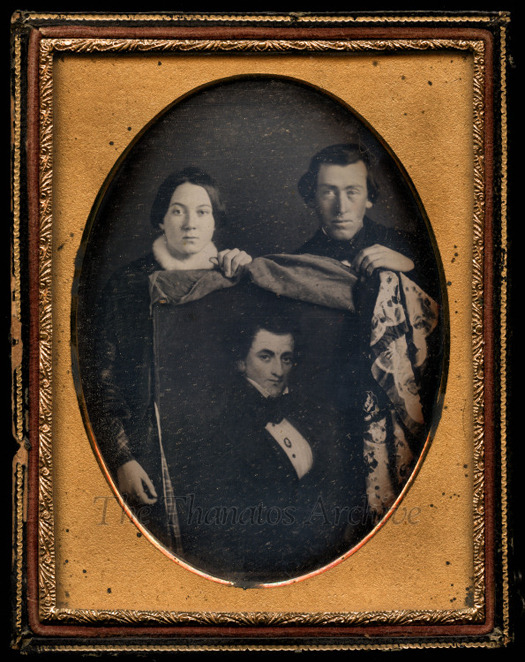
Father’s Portrait
A somber man and woman hold a large painted portrait.
The composition of this scene, with the painting as the centerpiece, as well as the design
on the outside of the case (an angel), both strongly suggest that this photo was taken as a memorial for the man in the painting.
There is a quite a strong resemblance between the two men; we believe they were most likely father and son, and the woman possibly a daughter of the dead man, or even the living man's wife.
Quarter-plate daguerreotype, circa 1850.
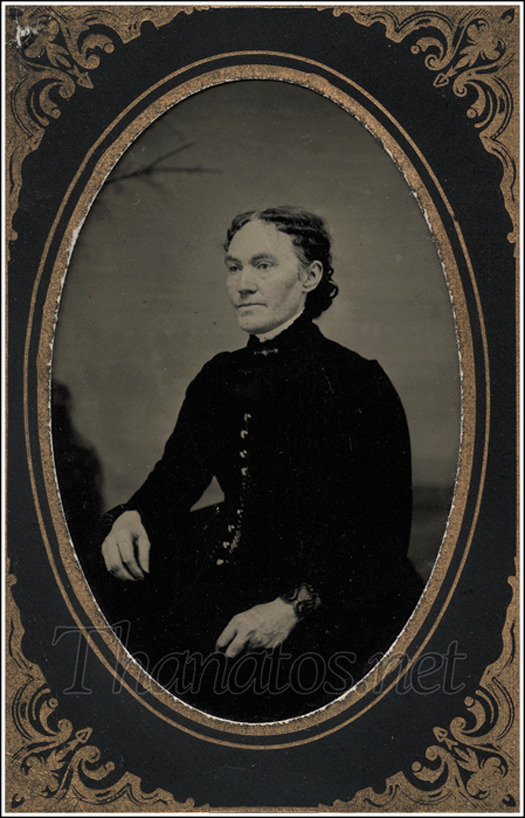
Widow in Profile
Circa 1886 tintype of a widow in black, 3/4 profile view.
Original black memorial style paper sleeve.
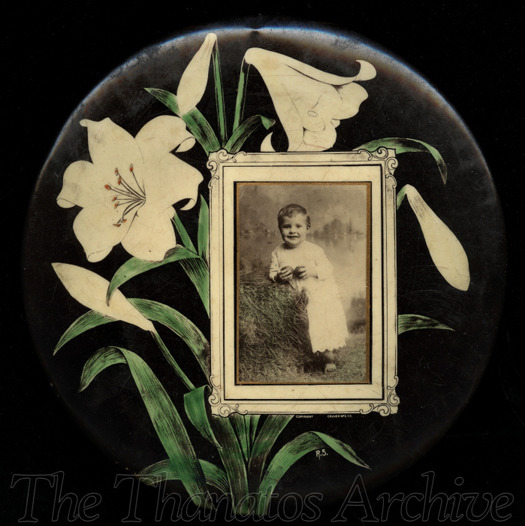
Day Lily Celluloid
These plaques were very popular around the turn of the century and typically came with metal stands, to allow for easy display. The flowers shown are day lilies, which were symbolic of a brief life.
Circa 1900 memorial celluloid plaque on tin, 8” x 8”.
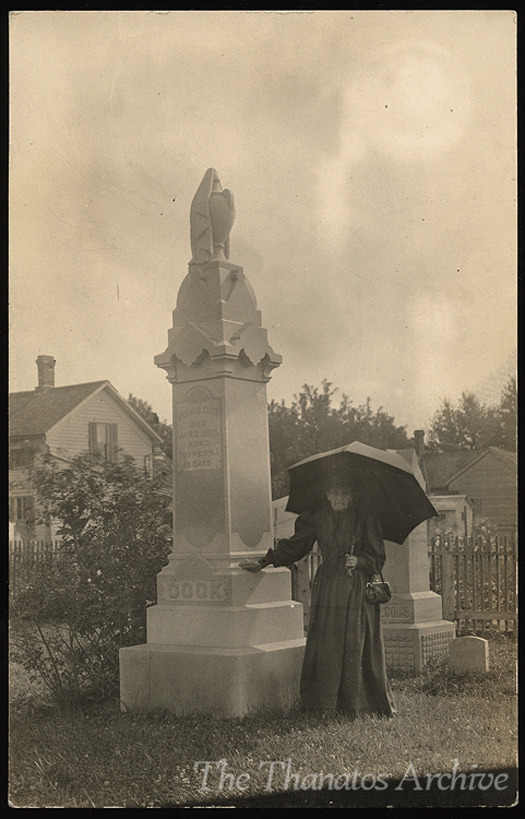
Woman in Mourning
Elizabeth Cook at her husband's grave.
Morris Cook, Jr .
Born March. 17, 1814
Died: January 3, 1885
Real photo postcard, c.1910.
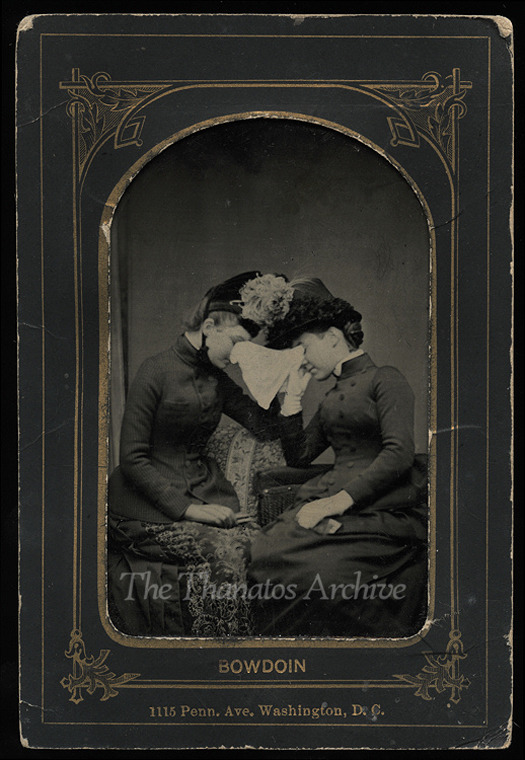
Poor Frank
Crying women sharing a handkerchief. On the back is written, "Me and Mary; Poor Frank Howard (?). Alas!" A black paper sleeve was chosen to house the image.
Tintype, Washington, DC, 1886.
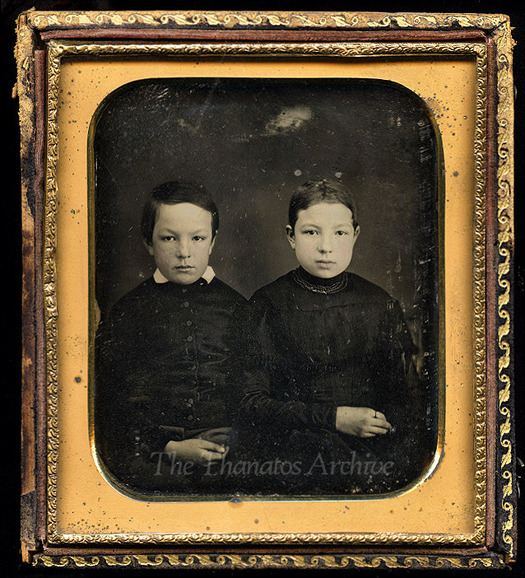
Siblings Mourn
Young siblings in mourning clothing and jewelry.
Circa 1850, quarter-plate daguerreotype (oversized).
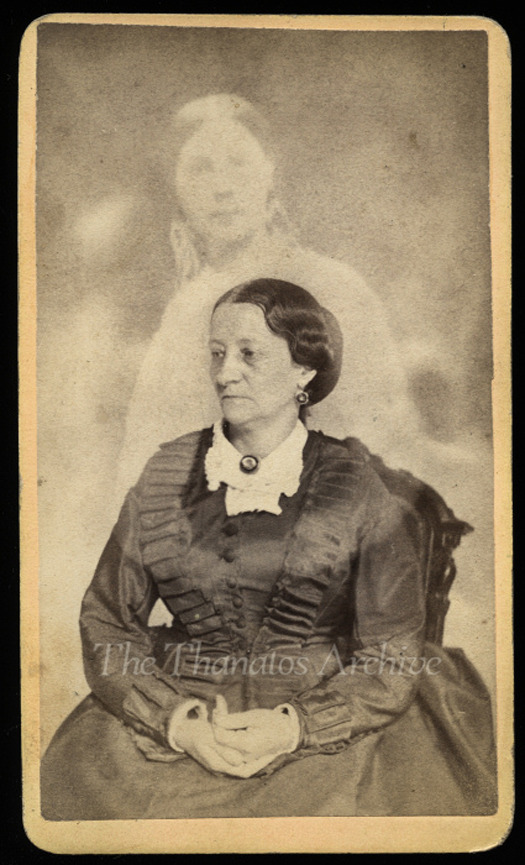
Spirit Photo
A woman posing with the spirit of a deceased relative, probably a daughter. Photographed by William H. Mumler.
Carte de visite; Boston, MA, circa 1871.
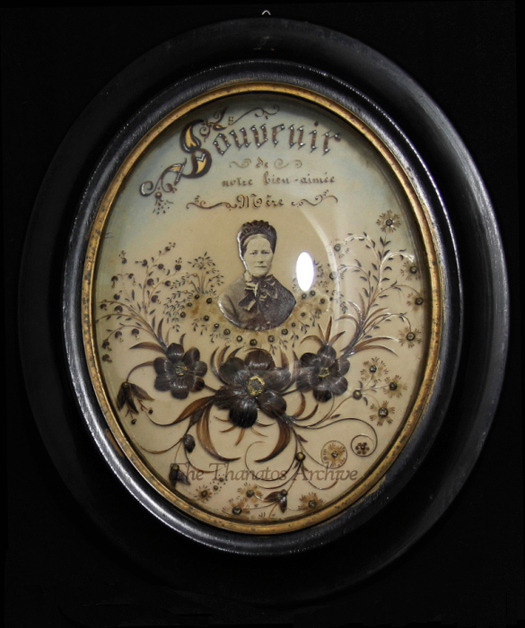
French Memorial
From the excellent book Mourning Art & Jewelry by Maureen Delorme:
c.1870s French memorial to a mother, with elaborate palette-worked hair on watercolored milk glass.
"Souvenir de notre bien aimee Mere" ("In Remembrance of my Beloved Mother").
12" x 10"
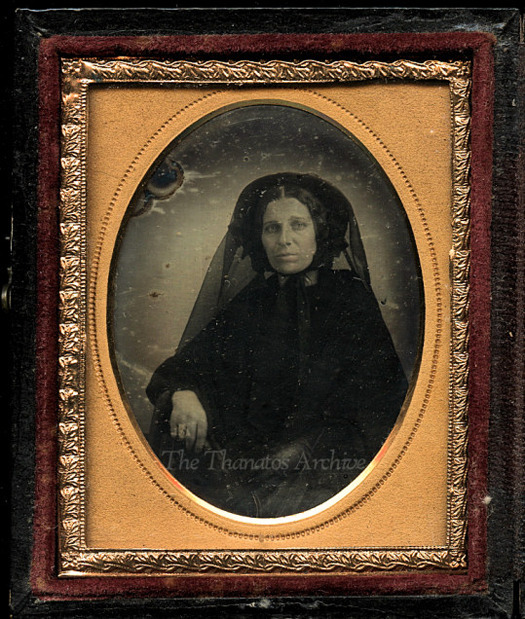
Missing Ring
Recent widow Huldah Shafer, who has removed the glove of her left hand (dags are mirror images) to show her missing wedding ring. In the Victorian Era, widows would often remove their wedding rings the day of their husbands' deaths, often placing them in their spouses' coffins.
Ninth-plate daguerreotype e, circa 1853.
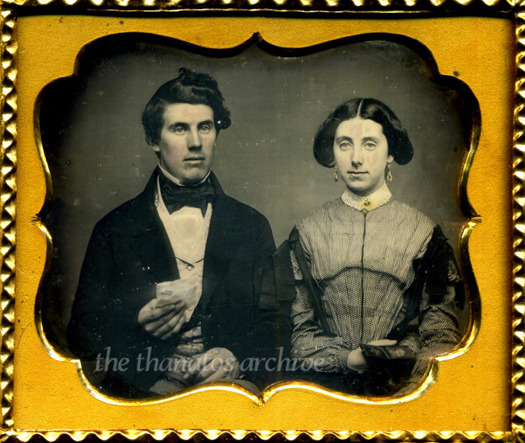
Young Parents
A young couple in mourning.
While not appearing particularly unhappy, the woman is in second-year mourning attire with black ribbons on her dress. She holds an open daguerreotype which, under magnification, appears to be an infant in a coffin. The man holds a piece of paper with what looks like a stamp on it, possibly a birth, death, or baptismal record.
Sixth-plate daguerreotype, c.1853.
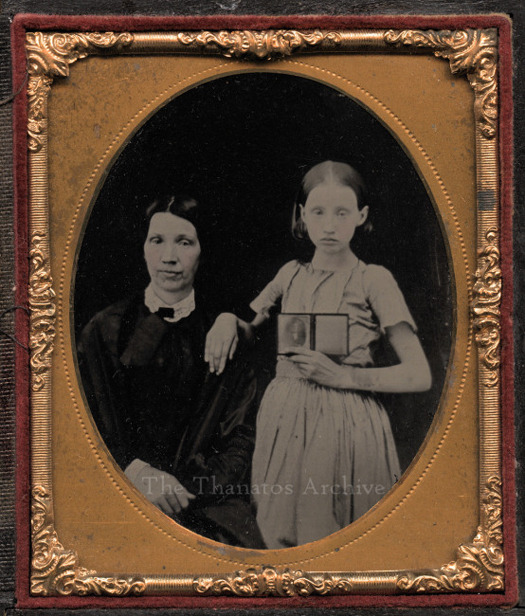
Sad Young Girl with Mother
The girl is holding a sixth-plate daguerreotype of a man, most likely her deceased father.
Sixth-plate ambrotype, circa 1858.
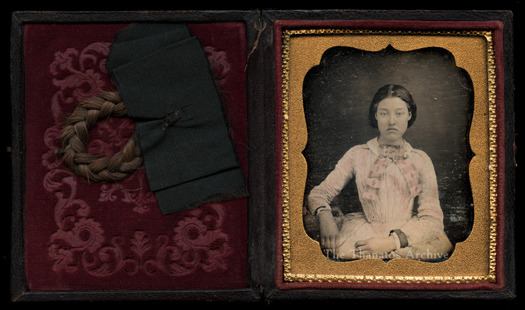
Girl in Pink
Girl wearing mourning bands. The cloth affixed to the pad is most likely part the same bands seen in the photo.
Sixth-plate daguerreotype, circa 1849.
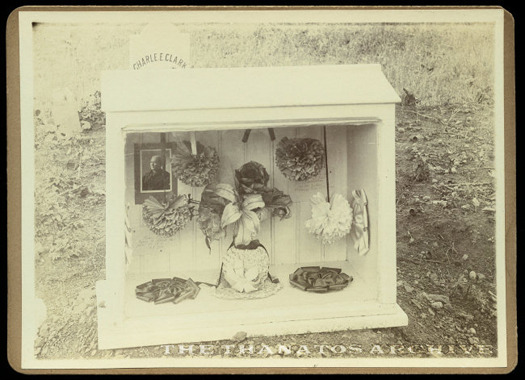
Shrine
An interesting shrine or temporary marker at the grave of Helen Clark.
The handwritten note below her photo on the left reads: "Helen C. Clark, passed to spirit life June 3rd, 1900. 69 years." The note on the right mentions that her Golden Wedding anniversary was on December 3rd, 1899.
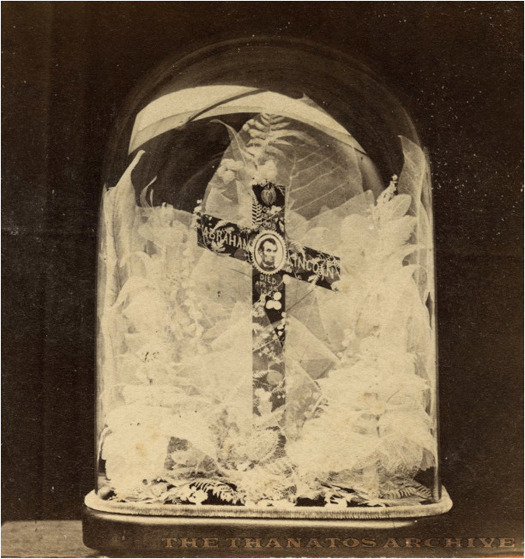
Memorial to Fallen President
A parlor dome with dissected leaves and a memorial cross with President Lincoln's image and date of birth and death.
Stereoview, c.1870.
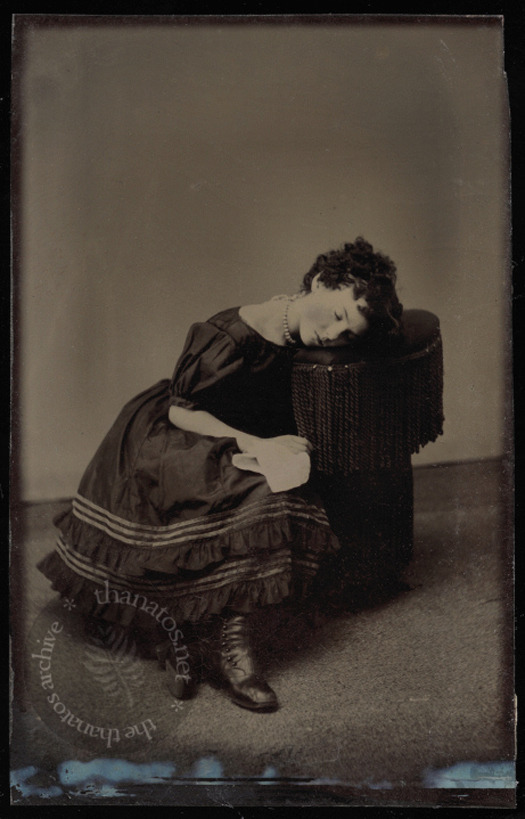
Portrait of Sadness
Though it's hard to say definitively, this is most likely a mourning image. Note the handkerchief.
Tintype, circa 1870s.
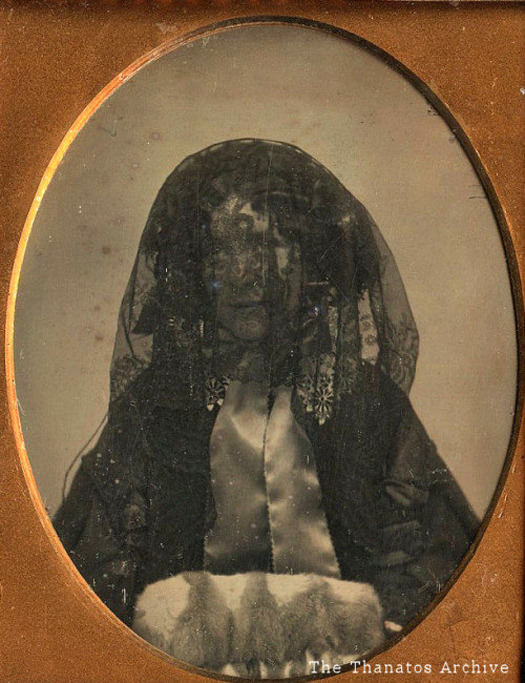
Woman Under Veil
Woman in mourning clothing, posing with a memorial portrait of a little girl, who is surrounded by clouds.
Carte de visite, circa 1866
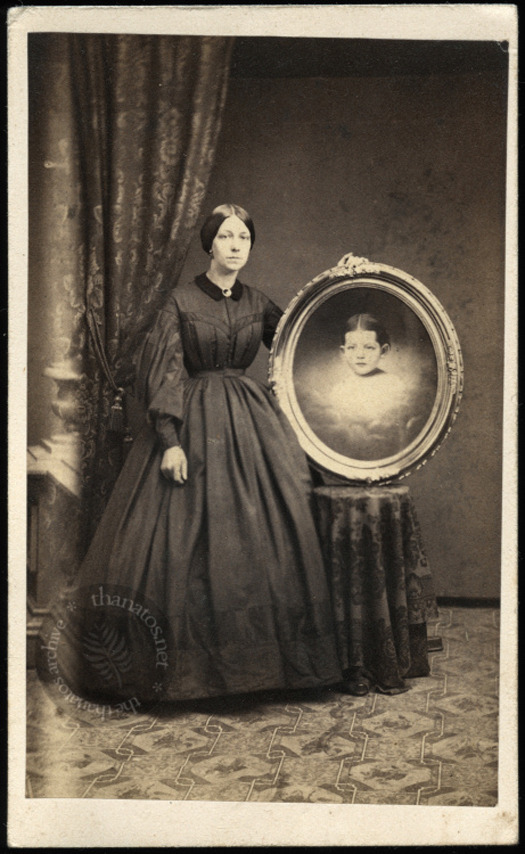
Portrait of Child in Clouds
Woman in mourning clothing, posing with a memorial portrait of a little girl, who is surrounded by clouds.
Carte de visite, circa 1866
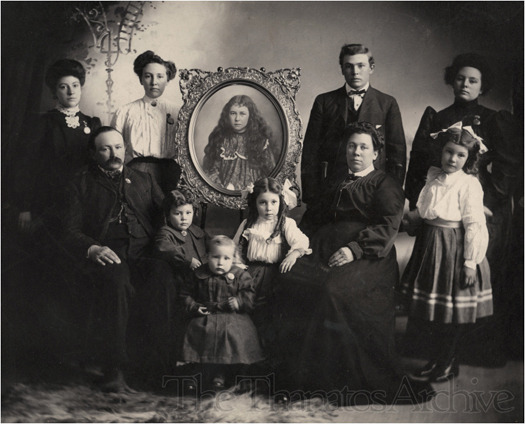
Family Mourns
A family posing with a memorial portrait of a little girl. Several of the family members are also wearing memorial portrait pins.
Gelatin silver print, circa 1899.
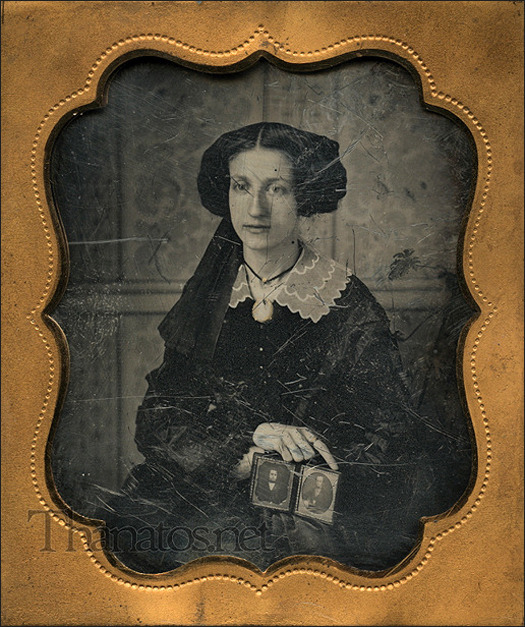
Woman With Daguerrotype of Loved One
Early-1850s daguerreotype of a pretty woman holding a double photo case, with images of two men. Although damaged, it remains a beautiful and compelling image.
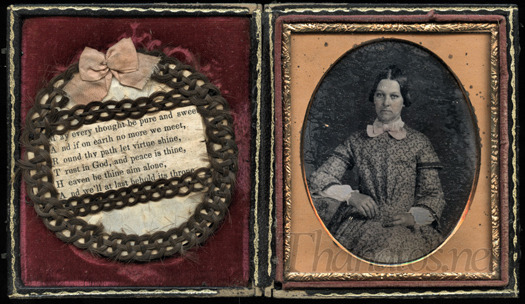
Martha
Portrait with hair work and memorial poem attached. The first letters in each line of the poem spell out the name "Martha," presumably the woman in the photo, whose hair was also used to make the intricate hair work piece.
Sixth-plate daguerreotype, circa 1850
